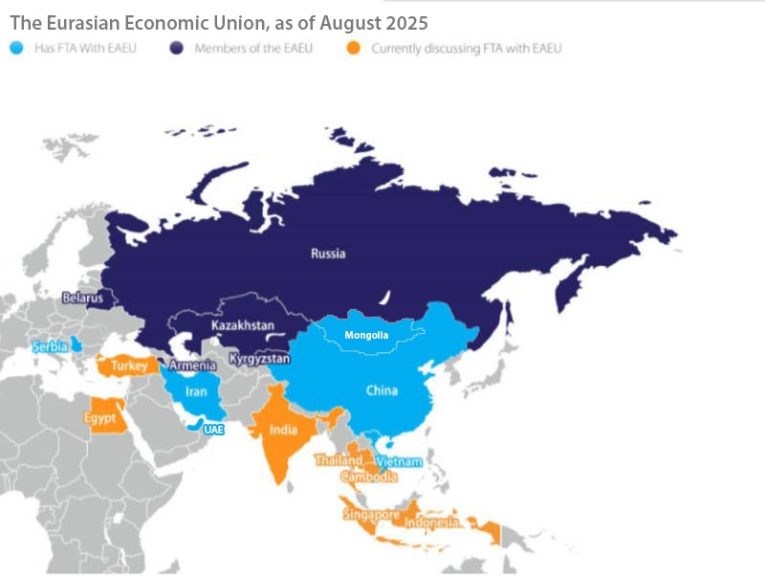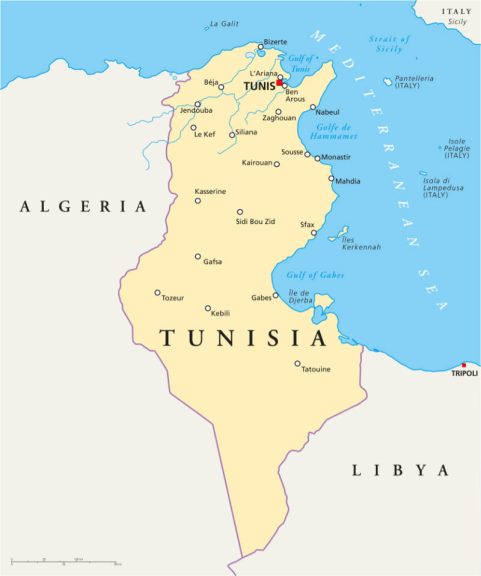Meetings chaired by Vladimir Serpikov, the Eurasian Economic Commission Trade Policy Department Director, have addressed the prospects of trade and economic cooperation between the Eurasian Economic Union (EAEU) and Tunisia, according to the Eurasian Economic Commission (EEC).
The EEC stated: “In particular, representatives of designated government agencies, the business community, and the academic community of EAEU member states have discussed the specifics of access of member states’ exporters to the Tunisian market, as well as ways to lift trade barriers. Tunisia is a significant actor in stimulating supply to the dynamic African market. The commission is exploring the relevance of a possible free trade agreement between the EAEU and its members and Tunisia.”
Serpikov added, “The discussion demonstrates the obvious mutual interest of both the EAEU and Tunisia in broadening cooperation. The sides aim to lift trade barriers in mutual trade and see a substantial potential for trade growth.” The Eurasian Economic Union includes Russia in addition to Armenia, Belarus, Kazakhstan, and Kyrgyzstan. It has other free trade agreements with Iran, Mongolia, Serbia, Vietnam, and the UAE and is negotiating similar deals with numerous other countries, including Egypt, India, and Indonesia.

Tunisia is located between the Mediterranean Sea and the Sahara Desert. It serves as a gateway to both Europe and Sub-Saharan Africa. Tunisia’s economy is wide-ranging, with key industries including agriculture, which is a major source of exports, such as olive oil, grains, dates, citrus fruits, and vegetables. The country is also a large producer of phosphates, which are crucial for global fertilizer production. Other minerals like lead, zinc, and marble are mined as well. The textile and apparel industry is another significant sector, exporting clothing to Europe. Tourism plays an important role in Tunisia’s economy, thanks to its cultural heritage and Mediterranean coast. The manufacturing sector includes electronics, automotive components, and food processing. Tunisia is also focused on expanding its energy production, including oil, natural gas, and renewable energy, and its services sector, such as banking, telecommunications, and IT, continues to grow.

Tunisia is part of several important trade agreements. As a member of the Greater Arab Free Trade Area (GAFTA), it benefits from reduced trade barriers with other Arab countries. Tunisia is also part of the African Continental Free Trade Area (AfCFTA), which aims to increase trade within Africa. Tunisia has been a member of the World Trade Organization (WTO) since 1995, benefiting from access to global markets. Since 2002, the United States and Tunisia have had a Trade and Investment Framework Agreement (TIFA) in place, which allows American companies to obtain insurance and financing for their businesses in Tunisia, as well as to export goods to that country. Tunisia was one of the first Arab countries to establish economic ties with the People’s Republic of China, and in 2018, the governments of the two countries signed a memorandum of understanding as part of the Belt and Road Initiative. An association agreement between Tunisia and Turkey has also been in force since 2005, and an association agreement between Tunisia and the EU (signed in 1995) has been in force since 1998. Currently, the EU is Tunisia’s largest trading partner, accounting for 67.2% of Tunisia’s exports and 45.2% of its imports in 2024.
With a population of around 12.3 million, Tunisia has a GDP (PPP) of US$122 billion and a GDP per capita (PPP) of US$16,390. The country’s GDP growth is projected to be 1.9% in 2025.
Trade between Tunisia and Russia has increased in recent years and grew about 40% in 2024 to reach about US$2.8 billion. Russia is now a key supplier of wheat, barley, and sunflower oil to Tunisia and has also started exporting powdered milk, meats and fish. Tunisia, in turn, exports dates, olive oil, and seafood to Russia. According to the Russian Union of Travel Industry (RST), Tunisia is considered a growing destination for Russian tourism in 2025, with demand for summer holidays in Tunisia tripling compared to 2024.
Further Reading
Continue Reading





 Русский
Русский










